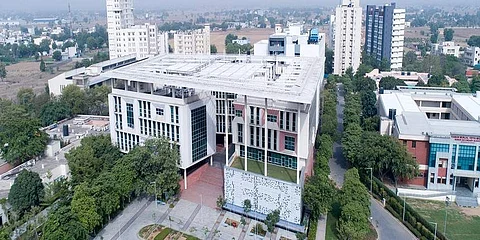

Are India's laws and regulations not as inclusive as they should be? Do they end up excluding 'key stakeholders'? Dr Pritam Baruah, Professor and Dean, School of Law, BML Munjal University (BMU), feels so and that's why the varsity has come up with the Centre on Law, Regulation and Technology (CLRT) that is set to fill this void with better research that would be more in tune with the needs of today. The centre was officially launched on December 4, 2021.
India is often looked upon as having traditional command and control regulation as its primary regulatory strategy, said Dr Baruah. "Our regulatory approaches are top-down in nature that often excludes key stakeholders. There is a crying need to infuse fresh energy into different forms of regulation tailored to different sectors of the society and economy. CLRT aims to populate this vacuum with fresh research and policy prescriptions based on wide stakeholder consultations and international collaborations," he added.
Regulation of technology is the key focus here. Unlike previous waves of technological innovation, new-age technology characterises human interaction, marketplaces as well as overall human experience. "CLRT is an endeavour to understand technology, its interaction with markets and its overall impact on welfare. Clarity on these questions will enable us to approach questions about unleashing the potential of technology as well as regulating its misuse. CLRT aims to influence policymaking on such issues through collaborative, objective, and interdisciplinary research," said the Dean.
But how will the centre be different from the existing courses on the law that are taught now? At present, technology in the legal curriculum and research is often treated as distinct domains but the BMU centre aims to cultivate an integrative approach. "It will look at technology and law as integral to their mutual existence by exploring the relationship between the two in a fine-grained way in distinct areas of law. This will unravel new patterns on how law and technology already mutually impinge and how they ought to evolve together in the future," said Dr Baruah.
Technology has become an integral part of our lives, especially over the past year and a half of pandemic-induced lockdowns. And one of the most used techs is AI. So why should law be left out? Dr Baruah said that AI can help with legal solutions as well. "For instance, AI-enabled search can reduce search costs and increase precision. AI can be employed to expedite repetitive tasks in legal decision-making. For instance, the grant of IP protection can be expedited through the use of AI. Here AI is a tool," said the professor. "AI will also interact with conventional laws as an independent technology. For instance, liability issues in self-driven cars, grant of patents for inventions by AI and collusion between firms through AI-enabled algorithms are issues where the law needs to develop a deeper understanding of technology to determine its legal implications," he added.
The judicial system in India has come under heavy criticism with respect to a few recent instances, be it the previous CJI asking a rape accused to marry the victim or a high court saying that it's not a crime under POCSO unless there is skin-to-skin contact. But in spite of that, there is hope. Dr Baruah said that India has often surprised the world with enduring as well as futuristic laws and this was possible due to its rich and complicated social context, as well as long-standing legal tradition. "However, Indian researchers have much to achieve in being leaders in thought in several directions. That can only happen if we pay close attention to and respond to the world around us, rather than fit in with existing influential traditions. Pushing new boundaries with responsibility is essential and that can only happen if we pay attention to facts around us and develop a scientific way of addressing the issues they raise. CLRT is imbued with this ethos," he added.
There have been talks about inculcating the essence of old Indian law and order systems in the modern-day judicial system and, at the same time, we are talking about using tech in law. But can these two be merged into one? "Old legal traditions at heart deal with much of the same issues as new legal systems do — interaction between humans and the world around them. They surprisingly raise the same ethical questions of responsibility, liability, rights, duties, justice and fairness," he said. Technology is amenable to be looked at through these lenses as well. Its interaction with humans and their environment is bound to raise similar questions of ethics, morality and efficiency. "So traditional wisdom is always welcome as long as it is relevant to our contexts," added Dr Baruah.
The centre will help students meet the challenges of the future, said the Dean. "Citizens of the future have to be technologically native as well as legally literate from a technology standpoint. Initiatives at CLRT will contribute towards preparing the next generation of students in this direction," he added.
